This article was medically reviewed by Janice Litza, MD. Dr. Litza is a board certified Family Medicine Physician in Wisconsin. She is a practicing Physician and taught as a Clinical Professor for 13 years, after receiving her MD from the University of Wisconsin-Madison School of Medicine and Public Health in 1998.
There are 7 references cited in this article, which can be found at the bottom of the page.
wikiHow marks an article as reader-approved once it receives enough positive feedback. In this case, several readers have written to tell us that this article was helpful to them, earning it our reader-approved status.
This article has been viewed 154,000 times.
Studies show that everyone is at risk for throat cancer, a general term that describes cancer of either the pharynx or larynx. Your risk factor may be increased if you use tobacco, drink excessive amounts of alcohol, or have HPV.[1] Although throat cancer is relatively uncommon, experts note that you should be aware of and recognize any potential signs of the disease. If you discover that you have any symptoms, see your doctor as soon as possible to confirm your diagnosis and start a treatment plan.
Steps
Identifying Throat Cancer
-
1Recognize your risk for throat cancer. Doctors know that throat cancer is caused by a genetic mutation in the cells of the throat, though they are not sure what spurs this mutation. Being aware of your potential risk for throat cancer may help you recognize the symptoms and get a timely diagnosis and treatment.[2]
- Men are more likely to contract throat cancer than women.[3]
- Your risk for developing throat cancer increases with age.
- People who smoke and use chewing tobacco are at a higher risk of developing throat cancer.
- Excessive alcohol consumption increases your risk.
- In fact, alcohol and tobacco consumption are the primary risk factors for developing throat cancer.
- Having HPV (human papilloma virus) can make you more prone to throat cancer.
- Not eating sufficient fruits and vegetables can raise your risk for contracting throat cancer.
- Having gastroesophageal reflux disease, or GERD, may also increase your risk.
-
2Determine possible symptoms. Most symptoms of throat cancer aren’t specific to cancer, so you’ll need to be extra vigilant about watching your oral cavity. Identifying possible symptoms of throat cancer may help you get a relatively expeditious diagnosis and treatment. Symptoms of throat cancer include:[4]
- Coughing.
- Changes in the voice, which may include hoarseness or inability to speak clearly.
- Problems swallowing.
- Ear pain.
- Sores or lumps that don’t heal on their own or with over the counter treatments.
- A sore throat.
- Weight loss.
- Frequent headaches.
Advertisement -
3Examine your throat for lumps and irregularities. Irregular growths and lumps can be a sign of throat cancer. Examining your throat may help you recognize unusual growths.[5]
- Stick out your tongue and see if you can identify any lesions or growths on it.
- It may be slightly more difficult to examine the inside of your mouth or your throat, but open your mouth as wide as you can and look inside. Shining a light inside your mouth may also help you recognize any irregularities.
- Check your mouth and throat regularly so that you know how the area looks usually.
- Look for changes in the appearance of your throat including differences in color or skin texture. Growths that appear wart or ulcer-like may indicate throat cancer.
- Schedule an appointment with your doctor if you notice any of these symptoms. Having regular dental checkups can also help with monitoring for any mouth or throat changes or concerns.
-
4Watch for pain or bleeding. Pay attention to your mouth and throat for any extended pain or bleeding in your mouth or throat. These symptoms might indicate a more serious condition such as throat cancer, in particular if they don’t heal.[6]
- Observe lingering pain in throat, especially when you swallow.
- Look for any bleeding from lesions, growths, or lumps.
-
5Talk to your partner or spouse. Ask your partner or spouse to look in your throat or ask if they’ve noticed symptoms of throat cancer. He or she may recognize symptoms or differences in your oral cavity more quickly than you do.
Getting a Diagnosis and Treatment
-
1Visit your doctor. If you find any of the signs or symptoms of throat cancer and/or are someone who is at risk for the disease, schedule an appointment to see you doctor as soon as possible. If diagnosed early enough, throat cancer is very treatable, with a rate between 50 to 90% depending on the stage at which your doctor diagnoses the disease.[7]
- You can see your regular doctor or an otolaryngologist, or ear-nose-throat doctor. If necessary, your doctor can send you to other doctors or specialists.
- Your doctor will most likely conduct an exam of your oral cavity and throat. She may also health history, which can include factors like your health habits and any past illnesses.
- Your exam may include having your doctor examine your throat with a lighted scope called an endoscope.
-
2Undergo tests for a definitive diagnosis. If your doctor suspects that you have developed throat cancer, she will probably order additional testing. Tests such as a biopsy or scoping can confirm a diagnosis of throat cancer.[8]
- The most common test for throat cancer is scoping. Your doctor will insert a small lighted scope, called an endoscope, into your throat or voice box and examine them through a video that the scope transmits.
- Your doctor may also perform a biopsy, where she removes cells or tissue from your throat and then sends them to a laboratory for furthering testing.
- In some cases, doctors will also prescribe imaging tests such as CAT scans or MRIs. Imaging tests can help your doctor determine how much throat cancer has spread.
- In the event that tests confirm throat cancer, you may require additional tests which can determine if the cancer has spread to other areas of your body.
- Additional testing may include a lymph node biopsy or more in-depth imagining tests.
-
3Receive treatment. If your doctor discovers throat cancer, she will prescribe a course of treatment based on the extent to which the disease has spread. There are several treatment options and they can be successful if your throat cancer is diagnosed early.[9]
- Your doctor will prescribe a treatment based the stage at which your cancer is diagnosed. You should also talk to your doctor about your options and what makes you comfortable.
- The four main treatments used to combat throat cancer are: radiation therapy, surgery, chemotherapy, and targeted drug therapy.
- Radiation therapy is often the only treatment necessary in the early stages of throat cancer. It uses high-energy beams from sources like X-rays to kill cancer cells.
- Surgery can be as simple as scraping cancerous cells off of your throat and voice box to much more extensive surgeries that remove part of the throat and lymph nodes.
- Chemotherapy employs drugs that kill cancer cells. In some cases, chemotherapy is used in conjunction with radiation therapy.
- Targeted drug therapy, which uses medications such as cetuximab, that attack certain defects in cancer cells. These drugs help slow or stop the growth of cancer cells.
- Consider taking part in a clinical trial of medication, which may give you the chance to try a new treatment method.
-
4Avoid tobacco and alcohol. Both alcohol and tobacco consumption are closely linked with throat cancer. Avoiding them as much as possible may make treatments more effective, but can also prevent recurrences of throat cancer once you’re healed.[10]
- Smoking has several effects for throat cancer patients. It can: make treatment less effective, decrease your ability to heal, and increase your risk of getting throat cancer again.
- Stopping your consumption of alcohol is also important. Not only can it increase the efficacy of your treatments, but may also minimize your risk for recurrences.
- If you are having a hard time quitting either tobacco or alcohol, which is especially difficult in stressful times, speak with your doctor about getting help to avoid these substances.
Expert Q&A
-
QuestionHow can you determine whether pain in your throat is caused by cancer or reflux?
 Janice Litza, MDDr. Litza is a board certified Family Medicine Physician in Wisconsin. She is a practicing Physician and taught as a Clinical Professor for 13 years, after receiving her MD from the University of Wisconsin-Madison School of Medicine and Public Health in 1998.
Janice Litza, MDDr. Litza is a board certified Family Medicine Physician in Wisconsin. She is a practicing Physician and taught as a Clinical Professor for 13 years, after receiving her MD from the University of Wisconsin-Madison School of Medicine and Public Health in 1998.
Board Certified Family Medicine Physician Pay attention to your symptoms and if eating or certain foods change your symptoms. Reflux is much more common and simple diet changes and medication can make a difference. Pain in cancer won't typically change with diet or reflux medication. See your doctor for further evaluation and discussion of your symptoms and concerns.
Pay attention to your symptoms and if eating or certain foods change your symptoms. Reflux is much more common and simple diet changes and medication can make a difference. Pain in cancer won't typically change with diet or reflux medication. See your doctor for further evaluation and discussion of your symptoms and concerns. -
QuestionI'm 16 and I found a lump in my throat. I am also having chest, neck, and ear pain. Could these be signs of throat cancer?
 Janice Litza, MDDr. Litza is a board certified Family Medicine Physician in Wisconsin. She is a practicing Physician and taught as a Clinical Professor for 13 years, after receiving her MD from the University of Wisconsin-Madison School of Medicine and Public Health in 1998.
Janice Litza, MDDr. Litza is a board certified Family Medicine Physician in Wisconsin. She is a practicing Physician and taught as a Clinical Professor for 13 years, after receiving her MD from the University of Wisconsin-Madison School of Medicine and Public Health in 1998.
Board Certified Family Medicine Physician Throat cancer is not typical in young people. It is more likely to be swollen lymph nodes from a recent infection, which can take weeks to resolve. Your doctor can do some basic tests to evaluate you further.
Throat cancer is not typical in young people. It is more likely to be swollen lymph nodes from a recent infection, which can take weeks to resolve. Your doctor can do some basic tests to evaluate you further.
Warnings
- Don’t ignore symptoms. If you suspect throat cancer or are even unsure, see your doctor as soon as you can. It’s better to be safe than sorry.⧼thumbs_response⧽
References
- ↑ https://medlineplus.gov/throatcancer.html
- ↑ https://www.cancer.org/cancer/laryngeal-and-hypopharyngeal-cancer/causes-risks-prevention/risk-factors.html
- ↑ https://www.cancer.gov/types/head-and-neck/patient/oral-prevention-pdq
- ↑ https://medlineplus.gov/throatcancer.html
- ↑ https://www.cancer.org.au/cancer-information/types-of-cancer/throat-cancer
- ↑ https://www.cancer.org.au/cancer-information/types-of-cancer/throat-cancer
- ↑ https://www.cancer.org/cancer/laryngeal-and-hypopharyngeal-cancer/treating/by-stage.html
- ↑ https://www.cancer.org/cancer/laryngeal-and-hypopharyngeal-cancer/detection-diagnosis-staging/how-diagnosed.html
- ↑ https://www.cancer.org/cancer/laryngeal-and-hypopharyngeal-cancer/treating/by-stage.html
About This Article
To identify possible symptoms of throat cancer, look for changes in your voice, like hoarseness or an inability to pronounce words. Additionally, note coughing, problems swallowing, weight loss, or ear pain. You should also feel around your throat for any irregular growths or lumps, and stick out your tongue to see if you can spot any lesions. If you have any of these symptoms, see your doctor as soon as possible to confirm a diagnosis and begin the necessary treatments. For advice from our Medical co-author on how to know if you have a high risk of contracting throat cancer, read on!

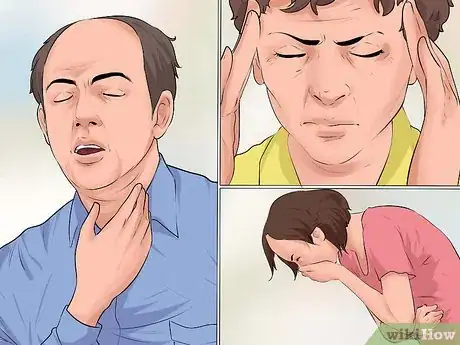
-Step-5.webp)
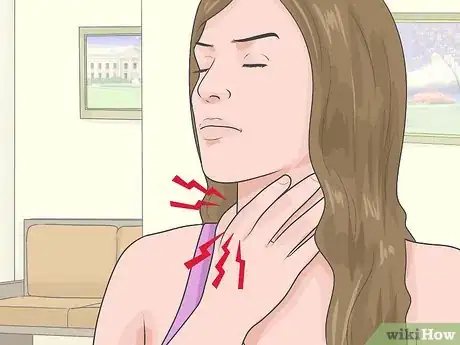

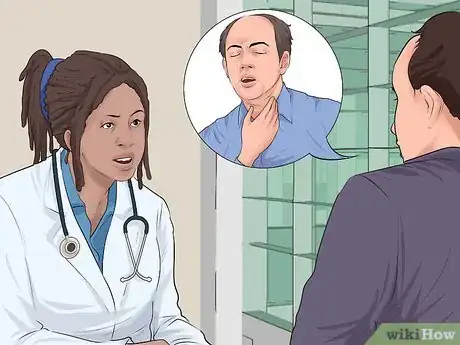
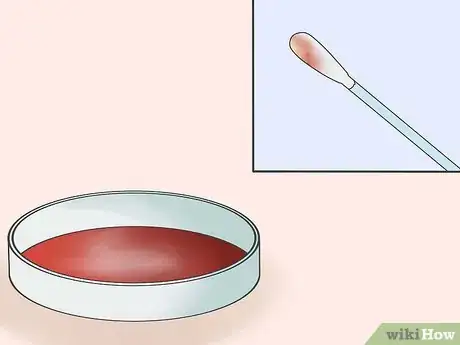

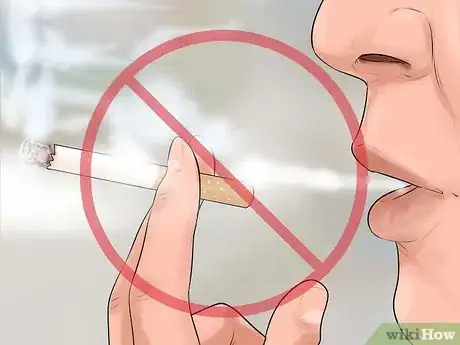
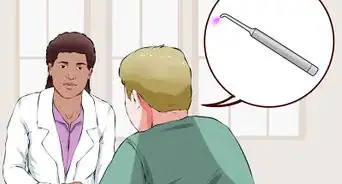

-Step-17-Version-2.webp)
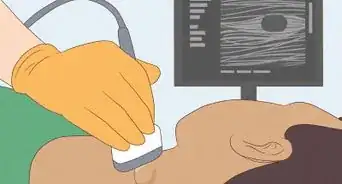
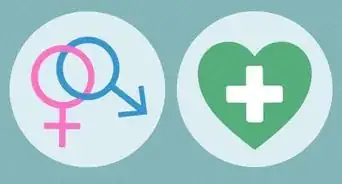
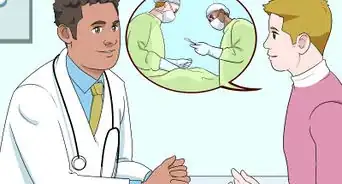

-Step-13.webp)


-Step-8-Version-3.webp)

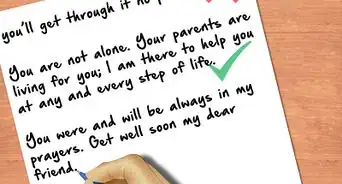












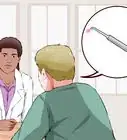

-Step-17-Version-2.webp)




































Medical Disclaimer
The content of this article is not intended to be a substitute for professional medical advice, examination, diagnosis, or treatment. You should always contact your doctor or other qualified healthcare professional before starting, changing, or stopping any kind of health treatment.
Read More...